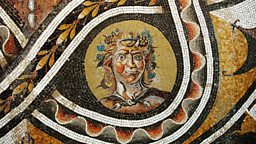Party animals: How ancient cultures let loose Bacchus-style
9 April 2018
The worshippers of Dionysos, known as Bacchus by his followers, took the pleasures of drinking alcohol dead seriously. So seriously the ancient Greeks described it as both a burden and a joy. Award-winning historian Bettany Hughes has been getting to grips with this raucous cult for her new BBC Four programme, Bacchus Uncovered: The Ancient God of Ecstasy.

The naked man on the pot looks pretty happy. Arms ecstatically outstretched, framed by grapes and vines, legs akimbo, he has an enormous erection. But this isn’t some erotic piece of art from the Classical or Baroque worlds. This terracotta pot dates back over 8000 years – to the Stone Age – and to the beginning of society itself.
Sex and drugs and rock ‘n’ roll have been lambasted as a symptom of the post-modern world, a vogueish search for extreme and excess – but I’d argue that our desire for release, to go wild, to get off our heads can be traced right back to the very beginning of civilisation itself.
Archaeological discoveries are jigsaw-puzzling together new evidence that alcohol, and the shared experience that revelry can encourage, were features of a number of the very first settled communities. That ecstatic man was moulded onto the huge pots containing traces of wine from the newly excavated Stone-Age villages near Gadachrili Gora in Georgia.
Other wine-jars, dating back over 7,000 years, have been discovered in a cave in Sicily along with evidence of ritual activity. There are wine-factories in Armenia, wine-cocktail vats in China. At the remarkable Mesolithic religious site of Gobekli Tepe, close to the Syrian-Turkish border, evidence of beer-making suggests humans may have domesticated crops not to make bread, but to enjoy booze.
The business of living together is, frankly, tricky. Drinking or any journey to rapture loosens inhibitions and the boundaries between individuals are dissolved. The community becomes the thing. In a perilous, punishing, prehistoric world the cohesion of the group didn’t just mean quality of life, it meant survival. All this helps to explain why, as soon as records begin, we hear of myth-stories such as the Middle Eastern Epic of Gilgamesh where the gift of alcohol to a wild, savage man, is a mark of his humanity.
It’s also why the early Greeks give the idea of ecstasy – literally standing outside yourself – a name and a face – Dionysos, or Bacchus as he was known by his cult-followers. He was a wildly exciting god who could cross borders of all kinds, travel continents, and was often portrayed as gender-fluid. Bacchus was even believed to break down the barriers between the living and the dead – offering his followers the chance of an after-life.
I’d argue that our desire for release and to go wild can be traced right back to the very beginning of civilisation itselfBettany Hughes


Some Greeks described him as Dionysos Psilax – he who gives men’s minds wings. His gifts were treasured for stimulating the creative juices, helping early communities think outside the box. One poet Archilochus declared he composed with his mind thunder-bolted by wine’ and the comic Cratinus sniped that water-drinkers never came up with ingenious ideas.
We’re told that Plato's Symposium were based on real, three-day long, regulated drinking sessions and attended by Socrates. These sought to identify the value and essence of emotional connectedness. The great festivals to Dionysos were heady, state-sponsored affairs, involving up to 70,000 people, featuring high-octane music processions. Trumpets, cymbals, flutes and drums all percussing the faithful (some of whom cross-dressed) into a gargantuan, bonding, trance-dance.
Partying, feasting, endorsing transgression and transcendence – it’s easy to imagine why Bacchus was so popular. Critically, and unusually, his cult was open to all – women as well as men, infants as well as adults, slaves and the have-nots as well as the haves.
In fact the Bacchic cult became so popular that in the early Roman Republic the Senate tried to shut it down. Developing into a quasi-parallel state, with a hierarchy, cult cells, and, most worryingly, female high-priestesses who initiated young men and indulged in orgiastic excess, this was all starting to feel troublingly subversive. But even the Roman machine couldn’t stamp out the Bacchic appeal. For at least 2,000 years the god endured as one of the most popular and powerful deities in Europe, North Africa and the Middle and Near East.
Neuroscientists and psychologists can now explain what the ancients instinctively felt. Alcohol promotes a chemical called Gaba which reduces brain activity – it stops what has been described as the ‘hamster wheel of anxiety’. Collective ecstasy can force a sense of belonging and unity. So when the counter-culture protagonists of the 20th century fought the suppression of the establishment – by tuning in, turning on and dropping out – being Bacchic was an explicit aim.
The academic Norman O. Brown would declare that ‘resisting madness can be the maddest form of being mad’. He was inspired in part by the legacy of Nietzsche, who claimed that Dionysiac intoxication was the basis of all creativity. The radical German philosopher would tragically end his life mentally unstable, signing his name Dionysos and dancing naked around his rooms in pursuit of Dionysiac excess.
He wasn't the only one so inspired. Jim Morrison styled himself the ‘new Dionysos’ and his band The Doors championed the unlocking of the doors of perception. But the Greeks were right when they described the gifts of Dionysos as being ‘both a joy and a burden’ for mankind. It seems that Morrison was alcohol-dependent when he died.
The father of social science, Emile Durkheim, back in the 19th Century, predicted that ours would be an age of loneliness and addiction. Excessive gaming, internet and drug use increasingly mean we seek our kicks, our dopamine highs, not together but alone. The opioid scandal spotlights the issue of self-medicating to achieve individual release. Maybe it’s time to embrace Bacchus as he was originally adored – to un-self in order to feel connected to those beyond us, to revel in Bacchic experiences that are intoxicating, not toxic.
Bacchus Uncovered: Ancient God of Ecstasy is on BBC Four on Wednesday 11 April at 9pm, then on available on iPlayer. For viewers outside of the UK, the programme will be shown on BBC World News on 28 and 29 April.

Critically and unusually, his cult was open to all – to women as well as men, to infants as well as adults, to slaves and the have-nots as well as the havesBettany Hughes

More from BBC Arts
-
![]()
Picasso’s ex-factor
Who are the six women who shaped his life and work?
-
![]()
Quiz: Picasso or pixel?
Can you separate the AI fakes from genuine paintings by Pablo Picasso?
-
![]()
Frida: Fiery, fierce and passionate
The extraordinary life of Mexican artist Frida Kahlo, in her own words
-
![]()
Proms 2023: The best bits
From Yuja Wang to Northern Soul, handpicked stand-out moments from this year's Proms
More from Civilisations
-
![]()
Hue knew? Five surprising facts about colour
Colour is a complicated and, at times, controversial topic.
-
![]()
Explore masterpieces of European painting
Five of the most significant paintings in the history of Western art.
-
![]()
Order a free poster from the Open University
OpenLearn, the OU’s home of free learning, helps you explore the art of different civilisations of the world.
-
![]()
Digital innovations
Explore artefacts using the augmented Reality (AR) app and 360 degrees videos, plus storytelling collaborations with UK museums and galleries.
-
![]()
The Czech and the Chieftains
How the Māori community turned the tables on colonial art.
-
![]()
9 fascinating facts from The Civilisations Podcast
Viv Jones' audio companion to the BBC Two series is taking us on some intriguing tangents.
-
![]()
The Inside Story
Mary Beard and Simon Schama reveal the inside story of writing and presenting the BBC Two series Civilisations.
-
![]()
Civilisations: Box set
Watch all nine episodes of the series on BBC iPlayer.












